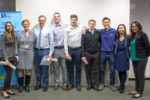
Deepa Prahalad, author of “Predictable Magic: Unleash the Power of Design Strategy to Transform Your Business,” introduces design thinking frameworks that can create strong emotional engagement between customers and firms.…Read More

Deepa Prahalad, author of “Predictable Magic: Unleash the Power of Design Strategy to Transform Your Business,” introduces design thinking frameworks that can create strong emotional engagement between customers and firms.…Read More

Joel Sadler, Founder and CEO of the education tech startup Piper, shares how his upbringing ingrained in him the ideals of universal design and resourcefulness that he brings to his company.…Read More

Interdisciplinary student teams applied design thinking to improve patient engagement with Penn’s personalized healthcare management site, MyPennMedicine.…Read More

One product design student’s CIP experience learning to innovate through an unexpected challenge.…Read More

The “experience engineering” approach to innovation encourages designers to think about the series of emotions a user needs to feel in order to buy a product. Elisa Jagerson, CEO of Speck Design, argues that managers need to adopt a similar approach when trying to establish a culture of innovation.…Read More

Our most recent conference examined the intangible factors that can make or break a company’s innovation outcomes.…Read More

Firms increasingly seek to use online communities as sources of ideas, innovations, and designs. However, many such open innovation efforts lack sustained participation and ultimately fail. This research sought to understand motivations to participate in a firm-hosted design community and how the nature of the design task influences sustained participation.…Read More

One factor affecting the replicability of routines is the template of what gets replicated. There isn’t much work on where this comes from. One view is that the routine is discovered over time. Another view is that in some cases firms prefer to copy the last incarnation exactly.…Read More
Mack Institute Senior Fellow and Wharton Vice Dean of Innovation, Karl Ulrich, taught the free course Design: Creation of Artifacts in Society this semester, via nonprofit education site Coursera.org.

A common approach to innovation, parallel search, is to identify a large number of opportunities and then to select a subset for further development, with just a few coming to fruition. One potential weakness with parallel search is that it permits repetition. The same, or a similar, idea might be generated multiple times.…Read More

Insight into the growth (or shrinkage) of “knowledge communities” of authors that build on each other’s work can be gained by studying the evolution over time of clusters of documents. We cluster documents based on the documents they cite in common using the Streemer clustering method, which finds cohesive foreground clusters (the knowledge communities) embedded in a diffuse background.…Read More